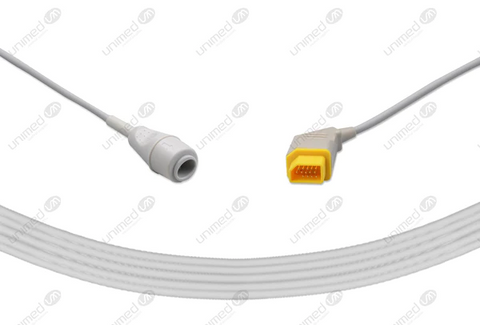Why the IBP Transducer Cable from Unimed Medical is a Must-Have for Patient Monitoring
Monitoring a patient's vital signs is crucial in healthcare settings, and having accurate data can make all the difference when it comes to their care. That's why the IBP Transducer Cable from Unimed Medical is a must-have for any medical professional looking to provide top-notch monitoring services. In this blog post, we'll explore the reasons why this innovative cable should be on your radar, and how it can help you deliver better outcomes for your patients. Get ready to revolutionize patient monitoring with Unimed Medical!

What is an IBP transducer cable?
The IBP transducer cable is designed to improve patient monitoring by allowing healthcare providers to connect various medical devices directly to the patient's monitor. This cable is also versatile, allowing it to be used with other monitors as well. The IBP transducer cable is a must-have for any healthcare facility that wants to improve patient care and monitoring.
What are the benefits of using an IBP transducer cable?
The increasing popularity of patient monitoring instruments has led to an increase in the use of IBP transducer cables. These cables provide accurate and reliable measurements of vital signs, providing valuable information to clinicians and patients. Here are some of the benefits of using an IBP transducer cable:
1) Accuracy: IBP transducer cables are highly accurate, providing consistent readings even when the patient's condition changes.
2) Reliability: IBP transducer cables are reliable, providing consistent readings even under challenging conditions.
3) Flexibility: IBP transducer cables can be used in a variety of settings, offering flexibility for clinicians who need accurate data.
How to choose the right IBP transducer cable for your needs?
If you are looking to purchase an IBP transducer cable for patient monitoring, there are a few things to consider. The type of transducer and the size of the cable will both affect the quality of the data collected. Here is a guide on how to choose the right IBP transducer cable for your needs:
First, it is important to decide what type of transducer you will be using. There are three main types of transducers: contact, capacitive, and resistive. Contact transducers use metal probes that touch the skin and send data directly to the sensor; capacitive transducers use small sensors that attach to clothing or other objects and send readings through body movement; and resistive transducers use long wires with small transmitters at one end and receivers at the other.
Next, you must figure out how large your cable needs to be. The larger the gauge (number of wires), the greater the data transmitted per second. Most IBP cables have 16-gauge wires, which is enough for most patients. However, you will need a higher-gauge line using a contact or capacitive transducer with a larger wire size.
Conclusion
If you are a healthcare professional responsible for monitoring patients, then the IBP Transducer Cable from Unimed Medical is essential. This cable allows you to quickly and accurately transmit medical data from EKG machines and other patient monitoring devices to your computer or, more importantly, to hospital systems. The IBP Transducer Cable is reliable and easy to use, so you can rest assured that your patients will receive the best possible care.

























